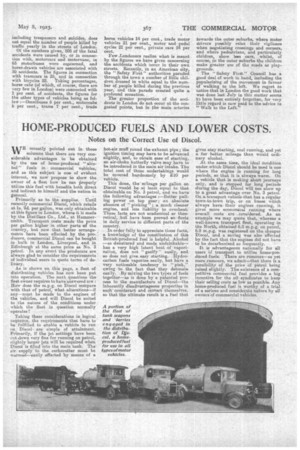HOME-PRODUCED FUELS AND LOWER COSTS.
Page 13

If you've noticed an error in this article please click here to report it so we can fix it.
WE recently pointed out in these columns that there are very considerable advantages to be obtained by the use of home-produced " alCohol " fuels in commercial vehicles, and as this subject is one of evident interest, we now propose to show the owner of a fleet how he can properly utilize this fuel with benefits both direct and indirect, to himself and the nation in general.
Primarily as to. the supplies. Until recently commercial Discol, which retails at is. 9d. per gallon, was only obtainable at this figure in London, where it is made by the Distillers Co., Ltd., at Hammersmith. Transport costs made the price per gallon higher in other parts of the country, but now that better arrangements have been effected by the producers, commercial Discol can be bought in bulk in London, Liverpool, and in Edinburgh at the same price as No. 3 petrol. In any event the producers are always glad to consider the requirements of individual users to quote terms of delivery.
As is shown on this page, a fleet of distributing vehicles has now been put into operation. The next questions the fleet owner requires to have answered are : How does the m.p.g. on Di:3.ml compare with that of petrol, what alterations—if any—must be made to the engines of the vehicles, and will Discol be suited to the nature of the conditions under which the fleet in question normally operates?
• Taking these considerations in logical sequence, the requirements that have to he fulfilled to enable a vehicle to run on Discolare simple of attainment. Primarily, if the jet settings have been cut down very fine for running on petrol, slightly larger jets will be required when Discol is filled into the main tank. The air supply to the carburetter must be warmed—easily effected by means of is
hot,-air muff round the exhaust pipe; the ignition timing may have to be advanced slightly, and, to obtain ease of starting, an air-choke butterfly valve may have to be introduced in the main air intake. The total cost of these undertakings would be covered handsomely by £10 per vehicle.
This done, the mileage per gallon on Discol would be at least equal to that obtainable on No. 3 petrol, and we have the following advantages :—Better pulling power on top gear ; an absolute absence of " pinking " ; a much cleaner engine, and less liability to overheat. These facts are not academical or theoretical, .bui: have been proved an fleets in daily service in different parts of the country.
In order billy to appreciate these facts, a knowledge of the constitution of this British-produced fuel is helpful. Alcohol —as denatured and made undrinkable— has a very high latent heat of vap-orization, does not " gasify " easily, and so does not give easy starting. Hydrocarbon fuels vaporizeeasily, 'but have a very noticeable tendency to "pink," owing to the fact that they detonate easily. By mixing the two types of fuels together—as is done by a patented prooess in the manufacture of Discol—the
i inherently disadvantageous properties n each counteract and correct themselves, so that the ultimate result is a fuel that gives easy starting, cool running, and yet a far better mileage than would ordinary alcohol.
At the same time, the ideal condition under which Discol should be used is one where the engine is running for long periods, so that it is always warm. On a vehicle that is makingshort journeys only, and is stopped for long periods during the day, Disco! will not show up to a great advantage over No. 3 petrol.Oit:a.transport vehicle that has a regular town-to-town trip, or on buses which always have their engines running, it give S more economacal running where overall costs are considered. As an example we may quote that, whereas a well-known transport fleet, operating in the North, obtained 6.8 m.p.g. on petrol, 6.9 m.p.g. was registered on the cheaper Discol, and a saving INELB also effected by the fact that the engines did not have to be decarbonized so frequently. It is advantageous nationally for all users -of transport to utilise home-produced fuels. There are rumours—as yet mere rumour, we admit—that there is a possibility of the price of petrol being raised slightly. The existence of a competitive commercial fuel provides a big incentive for the oil syndicates to keep their selling costs as low as possible. Any home-produced fuel is worthy, of a trial. of a serious and considerate nature by all owners of commercial vehicles.


































